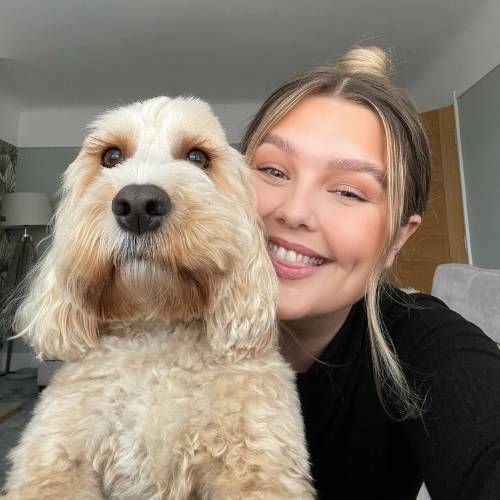Jasmine wants to raise awareness of the link between JIA and uveitis
24 January 2023
Jasmine, 23, is a trainee pharmacist. She was diagnosed with juvenile idiopathic arthritis (JIA) at the age of one and has uveitis, an inflammation of the eye which can lead to sight loss.
While JIA and uveitis are often linked, Jasmine is passionate that there should be more education and awareness around uveitis.
She says, “I don’t think there’s any awareness around uveitis. It’s not talked about.”
“We didn’t realise the severity of the situation.”
Jasmine was diagnosed with uveitis at just two years old. Due to the link between JIA and uveitis, all children and young people with JIA are offered a screening by a hospital eye specialist to detect uveitis as early as possible.
“I had a routine check for uveitis because the condition is quite common in children with JIA”, says Jasmine. “Then I found out I had uveitis. My pupil was the shape of a clover. I would get flashing lights and floaters in my vision.”
Symptoms of uveitis include eye pain, eye redness, sensitivity to light, blurred or cloudy vision, and the loss of the ability to see objects in the peripheral vision. However, uveitis can also develop without any noticeable symptoms.
While early treatment often keeps uveitis under control and can prevent serious problems, in rare cases uveitis can cause permanent sight loss. This is what happened to Jasmine.
At the age of seven, Jasmine had cataract surgery and lost all vision in her right eye. “Having cataract surgery at seven is unusual,” she says. “I went from being able to see one day to not being able to see at all the next.
“I can’t really remember the experience as I was so young. But I had to learn how to wear contact lenses as a child, which was difficult because they’re very fiddly. You can’t swim, sleep or shower with them in. It was a big adjustment.
“We knew I wouldn’t have vision after the surgery. But even simple things like doing eye make-up is so difficult because I can only see out of one eye. I don’t like how my eye looks because it drifts.”
“Without my lenses I can’t function.”

For people like Jasmine who have experienced sight loss because of uveitis, contact lenses play a big role. “Normally, I wear an artificial contact lens,” she says. “I get really strained looking at the laptop, and I get headaches. The contact lens helps keep the eye in focus. When I don’t wear it, everything is a massive blur.”
Over the last 6 months, Jasmine hasn’t been able to wear the lens. This has had a significant impact on her life. “My sight gets distorted and it’s hard to concentrate. Then I’m not able to drive. I can’t see after eye treatments so I can’t drive then, either.
“My eyes were a bit forgotten about.”
“I’d be limited if I couldn’t get a lift from my parents. Their whole lives revolve around taking me to hospital. I’m pretty reliant on the people around me.”
According to the NHS, uveitis affects around 2 to 5 people in every 10,000 in the UK, making it a rare condition.
But Jasmine feels her uveitis often gets overlooked. “At school, it was always to do with my joints and not my eyes. My eyes were a bit forgotten about. I got extra time in exams and breaks but more so to give my joints a rest.”
“Concentration was hard, especially if my eyes flared or I got double vision. People probably don’t realise the extent of my uveitis because my eye usually looks ok.”
“I don’t know what I’m going to be like when I’m older.”
Like many people with uveitis and their parents, Jasmine is worried about the future.
“I’m always really nervous when I go to the eye clinic because I don’t want bad news. I have tiny cataracts in the other eye, and I’m always worried it’ll get worse. Uveitis scares me to death to be honest.
“There’s not an awful lot I can do when my eyes get bad. The main things are to listen to doctors’ advice and not to ignore any red flag symptoms.”
But Jasmine knows there’s more to be done.
“A lot of people with arthritis have uveitis. We need to talk and share information about uveitis in the same way we do with arthritis.”
Jasmine is incredibly positive and wants to make a difference. “I want to move into the hospital sector after my degree”, she says. “I probably wouldn’t have ended up with a career in pharmacy if I hadn’t been in hospital so much throughout my life.”
We’re here to help
If you or a family member under the age of 25 has arthritis, we run a Young People and Families service that provides information and support and puts on a range of events across the country.
Our service helps young people and children offers advice on how to live well with arthritis, medication and potential treatments, as well as creating a safe space to ask questions, receive information and develop support networks.
Find out more about our Young People and Families service
If you have any changes to your vision, or your eyes are painful or red, tell your rheumatology team or GP straight away.
Find support in your area
You might also be interested in...
-
How our research is helping children with arthritis like six-year-old Lara
Lara was diagnosed with juvenile idiopathic arthritis (JIA) when she was just two years old. Then, a year later, she was diagnosed with uveitis – an inflammation of the eye, which can lead to sight loss. The good news is that Lara is now in remission after taking adalimumab, which was discovered thanks to one of our research trials.
-
What is juvenile idiopathic arthritis (JIA)?
Juvenile idiopathic arthritis (JIA) is inflammation of one or more of your joints. It first occurs before age 16. Learn about the causes, symptoms and treatment.
-
Arthritis tracker
Track your arthritis and general health with an easy-to-read summary to give you some hints on what to tell the doctor at your next appointment.